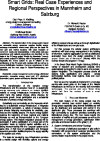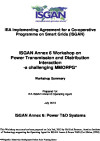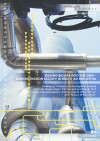Suchergebnisse
IEA Bioenergy Webinar: Synergies of Renewable Hydrogen and Biobased Value Chains - Case Studies
26. September 2024, 15:00 - 16:30 CEST
Online, AT
IEA Bioenergy invites you to the Webinar "Synergies of Renewable Hydrogen and Biobased Value Chains - Case Studies"
Green ICT for Sustainable Consumption? - Exploring Emerging Policies and Open Research Questions
17. - 18. January 2013
Palais Harrach, Freyung 3
1010 Vienna, AT
The event brings together high-level scientists, policy-makers and industry representatives to explore, discuss and address pressing questions on the potentials and challenges of Green ICT for enabling Sustainable Consumption
PH-Academy - "Passive house of the future" Academy platform for knowledge transfer between building developers
Builders and developers of residential buildings in low energy and passive house standard were invited to an academically moderated direct exchange of experiences, to turn them into competent users of new technologies.
Whitepaper "Smart Grids: Real Case Experiences and Regional Perspectives in Mannheim and Salzburg"

(2014)
A. Kießling, M. Strebl, A. Reuter
Herausgeber: nternational Smart Grid Action Network (ISGAN) Annex 4
Englisch, 6 Seiten
Downloads zur Publikation
ISGAN Annex 6 Workshop on Power Transmission and Distribution Interaction - a challenging MMORPG

Workshop Summary (2013)
Herausgeber: International Smart Grid Action Network, Austrian Institute of Technology
Englisch, 6 Seiten
Downloads zur Publikation
Feeding Biogas into the Grid - Demonstration Faciltiy in Bruck an der Leitha

Developing innovative technologies to produce and treat biogas, feed it into the grid and charge for it within the subprograms "Energy systems of Tomorrow" and "Factory of Tomorrow"
2/2009
Herausgeber: BMVIT
Englisch, 6 Seiten
Downloads zur Publikation
Manage_GeoCity - Development of a method for the coordinated management of geothermal energy in urban areas
Based on the urban region Graz a method had been developed for the coordinated use and management of shallow geothermal energy for heating and cooling as well as seasonal heat storage in urban regions. Ground water flow, different geologic conditions, heating and cooling demand, heat input from solar collectors and industrial waste heat and the possibilities of seasonal heat storage in the subsurface were considered.
Assessment of user requirements and technical feasibility of lightweight applications based on renewables
Assessment of user requirements was studied. Furthermore, the technical feasibility of se-lected lightweight applications based on renewables in the furniture and interior design sector is investigated through involvement of all relevant stakeholders (panel manufacturers - further processing enterprises - distributors - consumers) in the value chain.
Environmental, Material Flow and Sustainability Management Accounting - Offensive diffusion in adult education
Diffusion of the "Factory of Tomorrow" project line on environmental and material flow cost accounting (EMA and MFCA) for corporate and national system boundaries, as well as related tools for sustainability accounting in existing post graduate studies.
ZERMEG III - Decision guidance for the visualisation of the achievements of sustainable corporate strategies
ZERMEG III creates a virtual factory of the future from the combination of the research results of different projects. This model will be used to generate real experience for managers in experimenting taking organisational and technical decisions with regard to a sustainable development.
Bio bitumen - bitumen substitute based on renewable raw materials and resulting in energy efficient asphalt
Development of a binder for asphalt based on renewable raw materials. Studies to choose the ideal natural base product, regarding the aspect of utilization of remaining material and the elaboration of practical methods of synthesis were made.
Development of a moulding technique for wood-based composites for the production of biogenic SiC-Ceramics.
New methods to produce SiC- ceramics based on wood based materials were developed and the samples developed were characterized according to their properties. The main objectives dimension stability and carbon utilization was analyzed.
Transferproject: Professional strawbale building - "Virtual building-site", exhibition and instruction material
Strawbale-workshops are considered as the best way to inseminate this ecological building-technique. The "virtual building site" has some decisive advantages over the common situation: it does not depend on the weather, allows the comparative study of different constructing methods and can, as a permanent installation, be used as an exhibition.
Voltage stabilization by central reactive power control of biogas power plants (Virtual Biogas Power Plant)
A virtual power plant, combining 20 agricultural biogas plants is planned in the south-eastern part of the State of Styria (A). The aim of the project is to realize a central reactive power control system of the biogas plants. Active power of this biogas plants ranges between 1 and 3 MW. Specific goals of the project are increasing grid stability, decreasing long distance reactive power transmission, decreasing energy losses, and decreasing utility costs.
Evaluation of mechanical class room ventilation systems in Austria and generation of a planning guideline
Accumulation of technical solutions and practical experience of schools (kindergarten) with mechanical ventilation systems and identification of how pupils and teachers accept the systems.
PSS Strategies - Development of strategies for designing and implementing sustainable Product-Servicesystems
Based on a previous FdZ project it is intended to develop and implement strategies for sector specific sustainable product-servicesystems-innovations along product-chains in workshops with companies and other actors involved. Focus will be placed on implementation and possible restricting factors.
Basic research on the load bearing capacity and high thermal insulation properties of foam glass granulate
The aim of the scientific investigations is to find the characteristic parameters of foam glass granulate applied as load transfer layer and thermal insulation, to provide the base for the application of a multi functional and economical insulation material at the interface between building and ground for buildings of the future.
Life Cycle Cost Forecasting Model - Real Estate-Database analysis for life-cycle based investment decisions
Estimation of operational costs of buildings based on a "cause/effect model" between technical building characteristics, investment and running costs to support the decision making process in early planning stages regarding energy efficient buildings.
Evaluation of solar-thermal energy stores using a uniform and marketable system of characteristic numbers
Comparison of solar-thermal energy stores A clear and uniform system of characteristic numbers enables a cost-saving comparison of the efficiency of solar-thermal energy stores of different technologies for the first time and gives important impulses for the market.
Legal, economical and technical preconditions for the feed-in of biogas into the Austrian natural gas grid
Legal, economical and technical preconditions for a successful introduction and market development of fermentation gas feed-in to the Austrian natural gas grid. Appropriate legal and financial support regulations. Calculation basis for demonstration plants.
